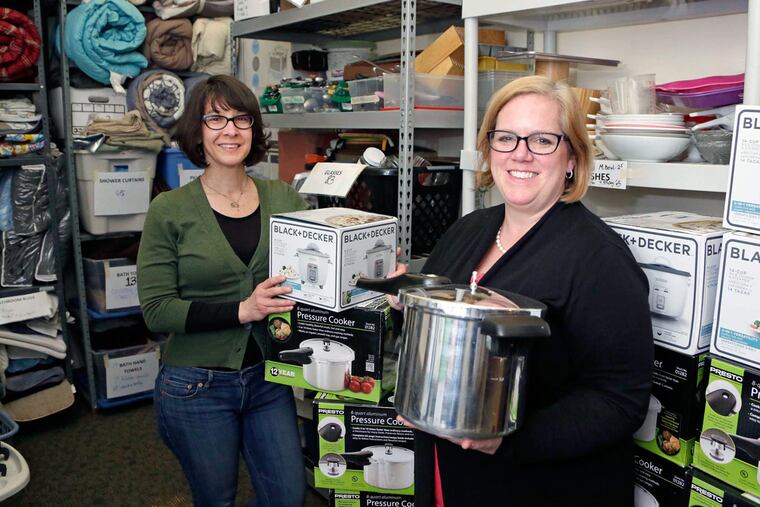Local charities win when 100 women give
Elizabeth Zack, a humble woman with a "why not?" attitude, calls it "just a nugget of an idea." Yet she and the growing group she founded last summer already are refining that bit of ore into a renewable source of charity gold.

Elizabeth Zack, a humble woman with a "why not?" attitude, calls it "just a nugget of an idea." Yet she and the growing group she founded last summer already are refining that bit of ore into a renewable source of charity gold.
Through collective giving, the fledgling 100 Women Philadelphia aims to become a transformative philanthropic force for an ever-changing array of social-advocacy nonprofits chosen by its members. Its decade-old parent association, 100+ Women Who Care, has given millions of dollars to charities through at least 100 branches nationwide and abroad, with more taking root.
In Pennsylvania, there are chapters in Bucks, Chester, and Lancaster Counties; State College; and Pittsburgh. In New Jersey, a group meets in Cape May.
Zack, 47, launched the Philadelphia chapter with an email to a few dozen friends in August, laying out its organizing principle: At meetings four times a year, 100 women donate $100 each to a freshly chosen local charity or nonprofit - an individual annual outlay of $400. Together, their contributions benefit four organizations with a combined force of $40,000.
The recipients so far, all in the city, have been CB Community School for at-risk youth, Nationalities Service Center for refugees, and Interim House for women with substance abuse and mental-health problems.
"There are a lot of organizations that can use help," said Zack, who lives in Philadelphia's Bella Vista neighborhood and teaches at Philadelphia School, a private elementary school near Fitler Square. "I couldn't do what I wanted to do on my own. I thought if we got together, we could have a bigger impact."
The national group was founded in 2006 by a Michigan woman. Zack - wife of a federal prosecutor turned defense lawyer, Richard Zack, and mother of two high school students - said she learned about the 100 Women concept from her mother-in-law, who lives in Michigan and has participated in a chapter there since 2012.
"I was feeling really happy and lucky in life," Zack said. "I have a great job. I have a great family. I love the city and felt, 'Why not try to help?' "
Fifty-four women answered her first email. By the second quarterly meeting in December, 63 had committed. By last month's meeting, 98 were on board.
Michelle Tepper, 49, a special-products developer for Exude Inc., a Center City employee-benefits firm, wasn't on the email list, but heard about the group from a friend.
"I'm totally in," she recalled saying. "I was brought up to believe you're supposed to give back."
Tepper offered her company's office, at 2218 Race St., as a venue for quarterly meetings. The next is scheduled for May 9.
Though not everyone shows up every time, all abide by the pledge to donate and know the drill: Members put forward slips with the names of deserving organizations. Three are drawn from a basket. Nominators have a few minutes to make their cases. Balloting determines the winner.
Also-rans can be renominated at later meetings.
The group's December donation of $6,300 to Nationalities Service Center for refugee resettlement shows the critical role that collective philanthropy can play.
Each refugee resettled in the U.S. gets a onetime federal grant of $1,125, so that a family of four starts life here with $4,500, said Juliane Ramic, NSC's director for refugee integration. However, prepaid rent and security deposits can eat up 80 percent to 90 percent of that stipend, and families are expected to be self-supporting within about four months.
That's where 100 Women's gift came in handy.
Next to NSC's $4.7 million budget, "it's not sizable," Ramic said of the gift. "But in terms of what we want to do, it is invaluable."
So far, she said, the money has helped buy "everyday necessities" not covered by the stipend.
NSC finds affordable apartments and outfits them with furniture and kitchen supplies. With part of the donation, 15 rice cookers and 20 pressure cookers were purchased for Burmese, Bhutanese, and Syrian families. Such appliances aren't routinely donated, Ramic said, and with rice "a staple in refugee diets, every family wants one."
Some of the money has gone to buy floor lamps for apartments without overhead lighting. Some paid for SEPTA tokens so the newcomers can "get to required appointments, doctor's offices, the Social Security Administration," she said, "and have a few extras to explore the city."
The gift also has been used to give onetime cash grants of $50 a person - pocket money "to buy reading glasses, or Tylenol for a child who has a fever, or spend on a cellphone," Ramic said.
Some of it, she said, also may be set aside for "a sudden housing crisis, or bedbug remediation."
What's left will go into gift cards at such places as Burlington Coat Factory, where refugees can select their own clothes.
"In a refugee camp, you are often deprived of the opportunity to choose for yourself. When we welcome a newly arrived refugee," Ramic said, "we want to restore that dignity and choice. The 100 Women grant helps make that possible."
215-854-2541@MichaelMatza1
For more information, go to https://www.facebook.com/100-Women-Philadelphia-1692558704293840